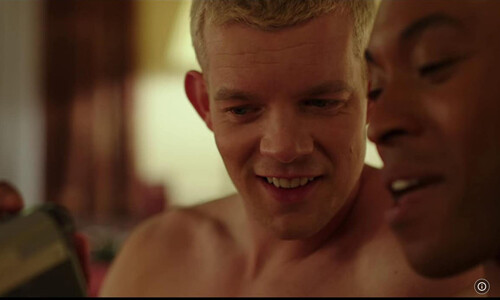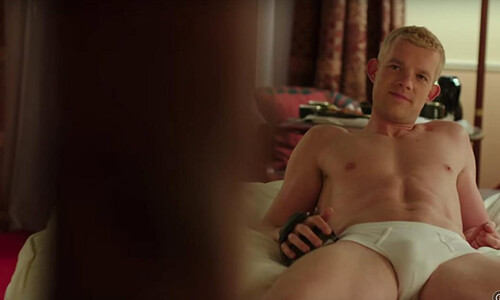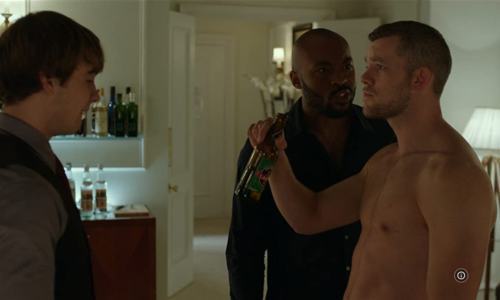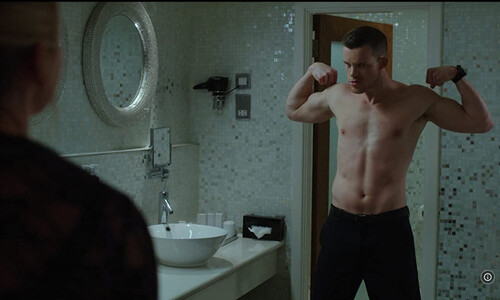The closet still stands. And few recent films remind us of its tricky dynamics as cogently as Ben A. Williams' The Pass. The film is about a footballer (Jason, played by Russell Tovey) who believes the closet is the only way he can achieve his dreams. The closet always exacts a price, but our footballer is happy to pay for it, I mean, literally pay for it.

Whenever rumors become too insistent or scandal seems inevitable, he actually has to pay "people" to create an alternative news story, so that his homosexuality remains out of the public eye. Or he has lawyers who will sue whoever spreads rumors on Twitter.
The film implies "everyone knows" he is gay, and as years pass he becomes careless, but this is OK as long as there is not some authorized public discourse about it (think Cristiano Ronaldo here, who Jason resembles a bit in the externals). The closet here is not exactly a secret, it is the pretense of a secret, which suggests that what people know is not as important as the circulation of knowledge.
Jason is aware of the compromised life he needs to accept, but, hey, this is about being rich and famous, this is about being an icon, an idol of the masses (the kind of masses that insist on the heterosexuality of their idols). Most of the time, the price seems worth it. On the other hand, he is the kind of idol who cannot and will not possibly be gay: this is not the world of pop music and not even the Disney channel, that well-known supplier of gay performers, this is football.

In one scene, which shows up his convoluted dealings, he pays a woman to record a sex tape with him and then upload it to the web, to dispel rumors, in another he threatens a guy he has humiliated with legal action should he post any comment. And years go on and life slips by.
Then he remembers, or maybe he has never forgotten, a moment of tenderness, ten years earlier, with another footballer, when they were both teenagers. And feels somehow he needs that back. To the end, he will insist the price of the closet is worth it as it guarantees he can have it all. Despite everything (at this late point of his life so many things keep slipping through his fingers and his future looks grim) he cannot face the fact that maybe some things he has not considered.
The film seems to suggest the closet is not really worth it if what you give in exchange is your whole life, the possibility of emotion, of happiness.

Then again, is the closet worth it? To many people, it has been, to many people it still is. You hope you will keep your secret under control, you hope sexual urges will fade away and you'll be left with a perfectly sound life. And it is the nature of the closet that you believe these things because the closet keeps you isolated from so many things. The trick is always to keep telling yourself that you can handle it.
Some cultures make the closet very easy as a fantasy. Every time I hear about gays in Italy, for instance, I feel that this is an example of a cynical approach that seems to make the closet preferable but not too stifling: you're inside, you can have an easy life protected and still enjoy the fantasy offered by patriarchal society. Being out limits you so much.
And, in the end, even if the information becomes public (and the trick is not to make that moment too shocking), nothing very serious will happen. It is an example of the benevolent closet. "Benevolent", that is, when compared to so many places where being revealed as a homosexual will mean the end of your reputation, your career, your loved ones, or your freedom.
I can't help thinking that benevolent closets are part of the larger idea, that benevolent closets in Western countries reinforce imposed, restrictive, threatening ones elsewhere. But even benevolent, even when one decides to take the compromise freely and without too much fear of consequences, one needs to agree to the closet is bad for society. It can be tempting, but it is irresponsible to encourage it.

Because, as Jason in the movie, one never really knows what he's getting into. Accepting the closet as a lesser evil means we are encouraged, kindly but firmly, to stay there. If we stick to our metaphor of the closet as a compromise in order to keep alive a certain kind of society, it follows that each time we are feeding into that compromise, it adds up to the force of that notion of society.
So the closet gains force in numbers: more and more people paying (what they regard as) small prices, means that still a great deal of life capital accrues to support the institution. Beware of the benevolent closet. When it is strong enough it can become fiercely inflexible.
Does Jason have an option? He could come out and lose his career ambitions. But this outcome is coming anyhow. At the end of the film, he is bitter. He will overcome his frustration, maybe, and try to find success elsewhere. Or he could cynically give up any risk of discovery.
Are those options open to everyone? The closet is something that, as most things, seem to matter less when you can afford it. Money, if you have it, is just money. Most people can´t, and what happens is they are putting their lives in the hand of an institution that promises to protect them but that they can do nothing about. As a structure, the closet can easily get out of control and demand a higher price than the one initially agreed. In life, one does not know what one is agreeing to.
On the other hand, we could take a stronger stand. The issue is that the closet is not an individual choice, it's a social one. Paying the price is like feeding a social illness. The film is aware of those things.
It does not say any decision will be easy, but at least does not claim easier is better.

